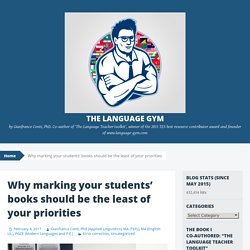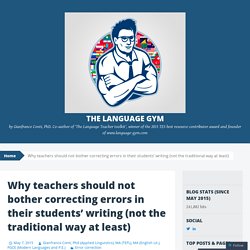

Why marking your students’ books should be the least of your priorities. 1.

Introduction Never, as in this day and age, secondary schools in the UK have made such a big fuss about the importance of marking student books and never has giving feedback been so tiresome and time-consuming for teachers. Based on the intuitively compelling notion – supported by recent research claims by the likes of Hattie – that a more cognitively demanding student involvement in the feedback-handling process significantly enhances learning, Modern Language teachers are now asked in many cases to place marking at the top of their priorities and engage in elaborate corrective approaches. The trending remedial methodology prescribing a conversation-for-learning approach to marking, whereby the feedback unfolds in the form of a dialogue between corrector and correctee, book-marking has become a very taxing process for both parties but especially for teachers. 2. 3. The obvious answer is ‘No’ as students and parents do demand we correct. . (1) the student must understand the correction;
Eliminating unnecessary workload around marking. Correcting all those errors? Step away from the red pen. (BlackBox) Disclaimer: No red pens were harmed in the making of this episode.

Here we confront a continual dilemma in language teaching. As language teachers who are good at the languages we teach, every error grates on our ears and eyes. We want to correct. We want to cross out the masculine ending and write the feminine one. We want to insert the missing article. Watch Karen’s informative review of this article on one researcher’s study. For more information about the Musicuentos Black Box collection of resources, including how to help keep this resource available for teachers everywhere, visit the Black Box page. Tags: assessment, black box, feedback, research, writing. Five things I do when I correct my students’ essays. My Ph.D study,Conti (2004), (as cited in Macaro,2004 and 2005, Ko Yin Sun, 2009, Goonshooly, 2012, Barjesteh, 2014, Cohen and Macaro, 2014, etc.) has provided me with great insight into the strengths and limitations of error correction.

The following is a very concise list of what I believe to be the most important strategies to deploy in the error treatment of surface level errors in foreign language writing. 1.Focus on the most important issues No point in focusing on every single error you find in your students’ writing when you are giving individual feedback on their essays. There is only so much attention a student can invest in the remedial learning process.
Select only a few errors (3 to 5) at a time using the following criteria Do not address, in individual feedback, errors that are common to most of the class, as they can be the focus of a series of remedial lessons for the class as a whole. Why teachers should not bother correcting errors in their students’ writing (not the traditional way at least) Metacognitive enhancement and error correction: a discussion of the shortcomings of traditional error treatment and of the potential benefits of learner training in self-monitoring strategies Dr Gianfranco Conti Garden International School (Kuala Lumpur) Dr Yoko Sato Hosei University (Tokyo) Abstract.

On Teacher Toolkit Feedback suggestions. 12 Ways to Embrace Marking and Feedback by @TeacherToolkit. There are a few days left before the end of term and this is one last marking and feedback blog before the summer holidays begin.

What feedback techniques could you use that make students think and take action? Marking has two purposes. One, students act on feedback and make progress over time. Two, it informs future planning and teaching. On Giving Feedback, or, You Have a Life, Too. At the end of February, I attended and presented at the 4th annual GATESOL IEP Mini-Conference in Atlanta.

It was a wonderful conference and it was great to have an event so focused on a specific teaching content, and meet other people who teach in that same context! Among the many great presentations I attended, one of the best was by Dr. Lauren Lukkarila called “Giving Writing Feedback: Freeing Yourself and Learners” (download the presentation and handout). Giving feedback on writing is hard.
First, it’s pedagogically difficult. This, of course, is just from the teacher’s perspective. Dr. Manage expectationsLet go What this means is that we should require less whole products to give comments on. Dr. Here is more of what Lukkarila said: Managing Expectations Beliefs – Managing expectations means that we need to rethink our writing beliefs. Letting Go Require fewer whole products and more revisions.Break down writing into smaller parts – even smaller than the paragraph level.
Like this: Lukkarila Presentation GivingWritingFeedbackFreeingYourselfLearners.